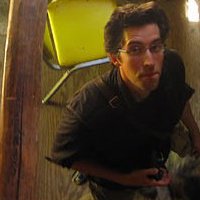 Matt Kempke is an indie game designer, the mastermind behind the freeware adventure game What Makes You Tick? released in 2007. Download the game for free here. For anyone who’s a fan of adventure puzzle games like those created by Lucasarts (the Monkey Island series) and Sierra (King’s Quest, Space Quest, etc…), you’ve got to check it out. This sort of game was hugely popular in mainstream commercial avenues in past years (especially the 90s), but in recent years the genre has taken a back shelf. Like Hollywood movies, most big companies spend their time on games that are certain to be blockbusters, and the end result is loads of games that are exactly like each other. There are exceptions to this rule of course, like Katamari Damacy, but they are just that–exceptions.
Matt Kempke is an indie game designer, the mastermind behind the freeware adventure game What Makes You Tick? released in 2007. Download the game for free here. For anyone who’s a fan of adventure puzzle games like those created by Lucasarts (the Monkey Island series) and Sierra (King’s Quest, Space Quest, etc…), you’ve got to check it out. This sort of game was hugely popular in mainstream commercial avenues in past years (especially the 90s), but in recent years the genre has taken a back shelf. Like Hollywood movies, most big companies spend their time on games that are certain to be blockbusters, and the end result is loads of games that are exactly like each other. There are exceptions to this rule of course, like Katamari Damacy, but they are just that–exceptions.
Enter the independent game developers. What Makes You Tick was created almost entirely by Matt alone, using the Lassie Adventure Studio, a free program that acts as a game framework so that the developer can concentrate on the art, animations, puzzles, and plot. The official summary of the game:
A young man named Nathan is sent by his University to find the mysterious Dr. Coppelius who disappeared about one year earlier. While searching around Coppelius’ last known residence, Nathan discovers that he’s not the only person seeking the old man â€
WMYT has been reviewed favorably by the BBC Collective and described in PC Gamer as a “gentle, humorous game with a smashing ambient-swish of a soundtrack”. When my only complaint about the game is that it is too short, that’s a good sign. It is a short game–I finished it in a couple hours–but the art is unique, the music fitting, the dialog humorous, and the puzzles are just the right difficulty, not so easy to be trivial, not so hard to be impossible.
And, if you like WMYT, then you’re in for a treat! Matt is nearing completion of the sequel, A Stitch in Time. He plans to charge a reasonable fee to download this one. I’m definitely going to do so. There aren’t enough adventure games in recent years, and a small fee is well worth the chance to play. Also, I’d love if Matt was encouraged enough by sales of this game that he went on to make a third game, and a fourth, and so on. There will be a demo available to download for free on March 18th (I’ll post a link when it’s available).
David Steffen: At the risk of sounding cheesy, what makes YOU tick? Why did you decide to make these games?
Matt Kempke: OK, so we start with the complicated questions, uh? Well, let me see … If I had never played “the Curse of Monkey Island” when it came out back in autumn of 1997, if Greg MacWilliam hadn’t become my pen pal about one year later and if he had not made his own game engine (LASSIE) in 2005 I would not have made WMYT. But the urge had been there ever since I played “the Curse of Monkey Island”, simply because it merged hand-drawn backgrounds, great characters and sound design into something that hadn’t been there before … an interactive cartoon? Or a painting to walk around in and where you can peek around corners to see what’s hidden there? I don’t know, but it consisted of places that I loved to walk around or simply to BE in. That was back in school when I still had to do horrible things like math homeworks … the horror … the horror … but it wasn’t that bad anymore when in the background on the family computer CMI was running; me and my brother could hear the sound of Puerto Pollo in the background (capital of Plunder Island) … the music, the water, the clock tower playing a LeChuck theme chime every 15 minutes. And suddenly then life was good – despite school and homework and whatever things troubled me back then.
As I got more into drawing and a bit of animating and sound editing after I finished school I made some short videos and other projects. Nothing special. But when Greg told me that he was working on a game engine I promised him to make a game for him … IF he finished the engine. Being a strange character just like me, he really DID finish it. When he did I started building what in the end became “What makes you Tick”. It wasn’t easy, but I had the basic skills … and if you combine elements like background, character, story, animation, sounds etc. you really create something that is bigger than the sum of its parts: a small world to explore. Just like “the Curse of Monkey Island” did for me ten years before. Of course – it is not as good … but I did the best I could.
David: What lessons did you learn while developing the first game that you were able to use while making the sequel?
Matt: The lesson I learned while making WMYT is that everything is a LOT more work in the end than it looks like in the beginning. So for the sequel after writing the story we went in and cut all locations from our room script that were unnecessary to tell the story, which was a hard thing to do for me. How nice for example would it be to have a small chapel there near the woods … what a nice place would that be to visit … but we had to keep things doable so it was cut. In the end “A Stitch in Time” became bigger than I had expected as well and I am still working on it – although I should have been done three months ago. The reason for that is that we really wanted the player to be able to visit the small town of Ravenhollow during day and night and to be able to actually switch between these two times of the day during the main act of the game. Of course that ended up to be more work than you could imagine it to be beforehand. Fortunately Greg had always a very realistic attitude and I learned to trust him on a lot of things. One of them is time planning.
David: What have you found to be the easiest part of game development? The hardest? the most rewarding?
Matt: The easiest and most fun part was the brain storming phase. When I talked to Greg or my brother about the story we came up with all these little details and connections that in the end make up a good story – which ours hopefully is. Also planning some character designs with my brother Sebastian (who did most character designs) on the phone and then him sending me a scanned sketch one evening later that looks just like I had imagined it – that is just great. It is really wonderful to work together with others on projects like this. When I made the first game I did it completely alone and for over a year I almost didn’t show anyone anything just because I was afraid that I started promising folks something that might never get finished in the end. So I really enjoy working together with others. The hardest parts during the development of “A Stitch in Time” were mostly those when I was overworked and exhausted and alone. The most rewarding is when all things come together in the end.
David: Since you don’t have a super-corporation with a marketing department to get the word out about your game, how are you going to spread the word? How will you convince potential buyers that your game is worth spending a bit of money?
Matt: Well, we decided to publish a relatively long demo, which consists of the first of four acts and makes up about 10 percent of the full game. This way gamers get a chance to play a bit and get into the game and the story – and if they are interested to see how the story continues and then at some point ends they will hopefully buy the full version. Greg does a great job building our website and also creating a streamable version of the demo, that people can play online in their browsers, while he is still programming for the game and doing his fulltime job. I am sure we will come up with some more ideas to spread the word, but from the experience of the release of WMYT back in 2007 I know that sometimes the news on the internet can travel much faster than one might expect. Back then we had published WMYT just on the Lassie website without much ado … and only a couple of days later it appeared in the “recommended free games” section of an online TV show here in germany, where I live. In one of the first months we had about 50,000 downloads… which was pretty surprising. Of course now we keep our expectations low since this larger second game is not free – but quite affordable, if I may add that.
David: Once A Stitch in Time is available for sale, at what point will you consider it a success? When you’ve broken even on the project? When you’ve made enough to live comfortably on the interest?
Matt: Well, we will be happy once the game is released no matter what – Greg and I both wanted to make this game and it is an amazing thing that we got to make it at all. Of course I really would be happy if Greg, who also produced the game, breaks even on the project. That is one of many reasons I am still able to keep on working after all these months. I really wish that does work out. And if then in the end we earn enough to keep on making games, that would be unbelievable … unthinkable even. I actively tried to ban thoughts like that from my mind when I started working on the game – simply because that might have a negative effect on the artist in me. I am making this game just because the story needs to be told and because we got the oppotunity to fulfill our dream of making an adventure game. You cannot pass on such an opportunity.
David: Will there be more games?
Matt: Yes, definitely. … but whether that will be something bigger and commercial like “A Stitch in Time” or just small games, that I do because I still feel the urge to make more and get better – I don’t know. We would love to do a third “What Makes You Tick” game, but that will depend on on how much of a “success” our game is once it is released.
David: If you had unlimited time and resources to create a game, what would that game be like?
Matt: It would be a collaboration of a lot of artists, creating a unique world with an exclusive soundtrack written directly for the game. That game should create a wide range of moods – like having a place that looks like a romantic Caspar David Friedrich painting connect to a Van Gogh like location … but gradually … merging styles and moods into something else that still feels like a whole. The process of planning and producing a game that combines many visions of actively involved artists must be a great thing. And if then you also add voice talents, animation and music – the sky is the limit. Well, but till then we will have to make do with what we can do.
David: When you’re not developing games, what do you like to do?
Matt: I like meeting friends, having a cup of coffee with them for three hours. Watching movies or Seinfeld. Listening to old Jack Benny radio programs. I also like hiking a lot … just walking and looking and hearing the sand under the soles of my shoes, no matter where. That might sound cheesy, but at one point I had always felt an urge to do something – to draw or write – when I was amazed by nature or life. It took me some time to JUST enjoy these things. That probably sounds like a quote from a 90-year old senior citizen – not that there is anything wrong with that.
David: If you could witness any event in history, what would it be?
Matt: I guess, I personally would just choose events in which I hadn’t been involved. As tempting as it would be to find out how it looked like from the outside when I was a kid or I did something good or something I regret now … I fear it would leave me scarred for life. Because it in the end might be too different from what I remembered myself … or too meaningless … or just too good to bare seeing again.
So – an event in history … (stares at the blinking cursor) … I really would have loved to see Nikola Tesla doing one of his presentations on electricity and other wonders. Or to sit in the audience during the recording of one of Jack Benny’s shows. (Obviously I want to be entertained.) Or to see the authors of my favourite books, comics and games during different stages of their work. I always wondered if they too have these days when they sit in between empty milk cartons … with shaggy hair … notes lying around everywhere … and they ask themselves: “What the heck am I doing here??” or “Darn … I need to go out there again to buy milk!”.
David: What is the sound of the end of the world?
Matt: Snake Plissken lighting a cigarette and saying “Welcome to the human race.”
David: What was the last video game you played?
Matt: You mean: “What is the last GOOD videogame you played”? Well, that is “Batman: Arkham Asylum”. Amazing. I was Batman. Finally. After suffering and playing all those Batman games since the NES days I was finally amazed, flabbergasted and speechless. Pure genious! And also I got what I always search for: a world to BE in. Even if it’s Arkham Asylum and full of screaming lunatics it was beautiful.
David: What is your favorite video game?
Matt: “The Curse of Monkey Island” is and will be my first and greatest love. But that aside it is hard to decide … “Uncharted” was fantastic – I hope I can play part 2 sometime!
David: What was the last movie you saw?
Matt: The last one was “O Brother Where Art Thou?” – I had seen it a couple of times already and enjoyed it as much as usual! The last movie I saw in the cinema was “The Imaginarium of Dr. Parnassus” and I enjoyed it for many many reasons. Just great.
David: What is your favorite movie?
Matt: The last movie that really astonished me was like a small enlightenment: “Werckmeister Harmonies” by Bela Tarr (Hungary). My top favourites that I usually show to people are “Harvey” with James Stewart and “Nobody’s Fool” with Paul Newman.
David: Matt, thanks for taking the time for the interview! I’m looking forward to playing the demo and then the final game (and hopefully many more).

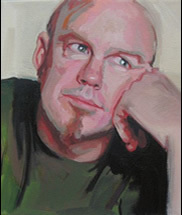

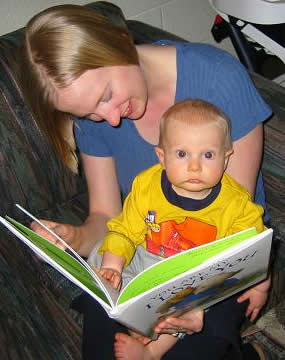 Nancy Fulda is a mom, writer, assistant editor of Jim Baen’s Universe, and the creator of Anthology Builder. Anthology Builder is an innovative website that allows customers to choose a set of short stories that are then printed and bound into a printed anthology just for them.
Nancy Fulda is a mom, writer, assistant editor of Jim Baen’s Universe, and the creator of Anthology Builder. Anthology Builder is an innovative website that allows customers to choose a set of short stories that are then printed and bound into a printed anthology just for them. Jeremy C. Shipp is a writer of all kinds of disturbing stories that have been seen, or will be seen at Cemetery Dance, ChiZine, Harlan County Horrors, Apex Magazine, and Pseudopod. His books include Vacation, Sheep and Wolves, and Cursed.
Jeremy C. Shipp is a writer of all kinds of disturbing stories that have been seen, or will be seen at Cemetery Dance, ChiZine, Harlan County Horrors, Apex Magazine, and Pseudopod. His books include Vacation, Sheep and Wolves, and Cursed. Nick Rose is a talented horror illustrator with publications in several Horror publications including
Nick Rose is a talented horror illustrator with publications in several Horror publications including 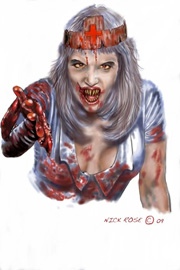
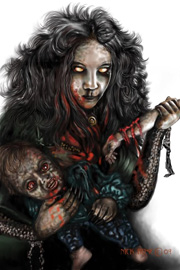
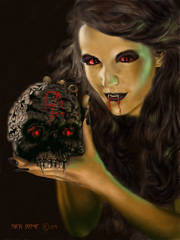
 J.W. Schnarr writes horror stories from his home base of Calgary. He has been published in a variety of places, including Andromeda Spaceways Inflight Magazine, Night of the Giving Dead, and Midnight Echo, to name just a few. As if that wouldn’t keep him busy enough, he is also the evil mastermind behind Northern Frights Publishing, an Indie publisher specializing in small market genre fiction and non-fiction. Hot off the press: Shadows of the Emerald City, an anthology of horror short stories related to The Wizard of Oz. The anthology has experienced a slight delay in release date, but will hopefully be available on Amazon in the next day or two.
J.W. Schnarr writes horror stories from his home base of Calgary. He has been published in a variety of places, including Andromeda Spaceways Inflight Magazine, Night of the Giving Dead, and Midnight Echo, to name just a few. As if that wouldn’t keep him busy enough, he is also the evil mastermind behind Northern Frights Publishing, an Indie publisher specializing in small market genre fiction and non-fiction. Hot off the press: Shadows of the Emerald City, an anthology of horror short stories related to The Wizard of Oz. The anthology has experienced a slight delay in release date, but will hopefully be available on Amazon in the next day or two.